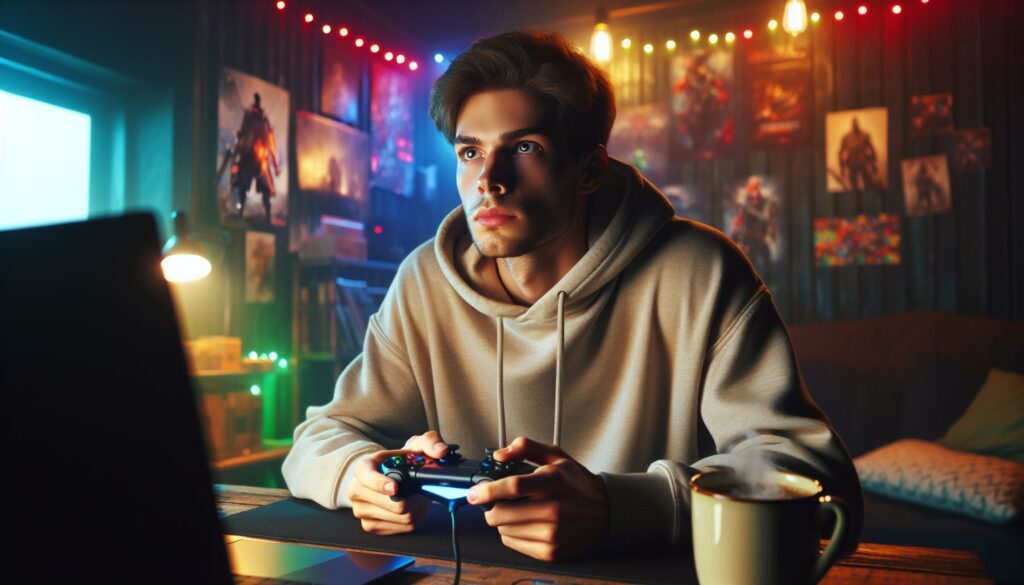Anxiety gaming has become a buzzword in the gaming community, and for good reason. As someone who’s navigated both the challenges of anxiety and the immersive world of video games, I’ve discovered a unique connection between the two. Gaming can offer a much-needed escape, allowing players to manage their anxiety while engaging in captivating narratives and dynamic gameplay. But it’s not just about distraction. For many, gaming serves as a safe space to confront their feelings and find solace in virtual worlds. Whether it’s through cooperative play or solo adventures, anxiety gaming provides a platform to explore emotions and build resilience. Join me as I delve deeper into how this phenomenon is reshaping the way we understand mental health and gaming.
- Definition of Anxiety Gaming: Anxiety gaming is the practice of using video games as a coping mechanism to alleviate anxiety and stress, providing comfort and an escape from real-world pressures.
- Psychological Benefits: Engaging in video games can foster emotional control and resilience, allowing players to distract themselves from negative thoughts and face personal challenges in a safe environment.
- Community Support: Gaming promotes connection through supportive online communities, enabling players to share experiences and normalize discussions about mental health, thus reducing stigma.
- Recommended Games: Titles like Stardew Valley, Journey, and Animal Crossing: New Horizons provide relaxing gameplay experiences that contribute to mental well-being and social interaction.
- Addressing Criticisms: While anxiety gaming has benefits, it’s essential to be aware of potential negative effects such as addiction and social isolation, emphasizing the importance of maintaining balance.
- Responsible Gaming Practices: Setting healthy boundaries, monitoring gaming time, and balancing gaming with other activities can enhance the positive effects of anxiety gaming while minimizing drawbacks.
Anxiety Gaming
Anxiety gaming refers to the practice of using video games as a coping mechanism for anxiety symptoms. This approach often offers comfort and distraction, enabling players to manage their mental health more effectively.
Definition of Anxiety Gaming
Anxiety gaming occurs when individuals engage with video games as a means to alleviate stress, manage anxiety, and create a sense of control. Players may immerse themselves in gameplay to escape real-world pressures or to experience a supportive community, helping to ease their mental strain. Some studies suggest that relaxing game genres, like simulation and adventure, particularly appeal to those seeking relief from anxiety.
The Psychology Behind Anxiety Gaming
The psychology of anxiety gaming reveals how gaming environments can foster emotional control and resilience. Engaging narratives and interactive gameplay can distract players from negative thoughts, creating a temporary haven. Additionally, games that offer characters overcoming challenges may inspire players to confront their own struggles. The repetitive nature of gaming also aids in reducing anxiety by providing predictability and structure, leading to feelings of accomplishment and self-efficacy.
The Benefits of Anxiety Gaming
Anxiety gaming provides multiple advantages for individuals facing stress and emotional challenges. Engaging with video games creates opportunities for relief and connection.
Coping Mechanism for Anxiety
Anxiety gaming serves as a tangible coping mechanism. Games enable players to immerse themselves in activities that divert attention from anxiety triggers. Interactive gameplay offers a sense of achievement through challenges, increasing self-efficacy. When I play, the structured environment helps reduce feelings of chaos, fostering a sense of control over my emotions. Moreover, genres like role-playing games (RPGs) allow me to navigate character arcs that resonate with personal challenges, reinforcing my own ability to confront obstacles.
Community and Support
Anxiety gaming fosters connection within supportive communities. Online platforms, forums, and multiplayer games allow players to share experiences, forming bonds through mutual understanding. I often encounter individuals who relate to similar struggles, providing a sense of belonging. Collaborating with others in games can enhance feelings of support, as players uplift each other in both gameplay and personal challenges. These communities create safe spaces where discussing mental health becomes normalized, further diminishing the stigma surrounding anxiety.
Popular Games for Anxiety Relief
Several games stand out for their capacity to alleviate anxiety, providing comfort and a refuge from daily stressors. These titles promote relaxation and encourage social interaction, fostering mental well-being.
Titles That Promote Relaxation
- Stardew Valley: This farming simulation game allows players to cultivate crops, raise animals, and engage with townsfolk, creating a peaceful and fulfilling environment.
- Journey: An introspective adventure game with stunning visuals and minimal dialogue, offering a serene experience as players explore vast deserts.
- Animal Crossing: New Horizons: This life simulation game lets players create and customize their own island, promoting creativity and low-pressure interactions with adorable animal villagers.
- Mos Mosh: A mindfulness and meditation game designed to help players discover calm through guided breathing exercises and relaxing visuals.
- Flower: In this artistic game, players control petals floating on the breeze, exploring lush environments while enjoying a soothing soundtrack.
- Minecraft: This sandbox game enables players to build and explore together, fostering collaboration and creativity in a supportive online community.
- Among Us: A multiplayer party game where players work together to identify impostors, promoting teamwork and communication in a fun atmosphere.
- Animal Crossing: New Horizons: Beyond its relaxing qualities, the game encourages players to visit each other’s islands, creating a sense of community and connection.
- Terraria: This adventure game features cooperative multiplayer gameplay, focusing on exploration and resource gathering while allowing for social bonding.
- Final Fantasy XIV: This MMORPG provides a rich storytelling experience while encouraging players to join together in quests, raids, and social events, building friendships and reducing isolation.
Criticisms of Anxiety Gaming
Anxiety gaming, while beneficial for many, faces criticism regarding its impact on mental health. Some players and observers raise concerns about potential negative effects and common misconceptions surrounding gaming and mental well-being.
Potential Negative Effects
Gaming can lead to several adverse outcomes, including addiction and social isolation. Players may find themselves devoting excessive time to gaming, neglecting real-life responsibilities and relationships. This behavior can exacerbate feelings of loneliness and anxiety, counteracting the calm gaming environments intended to provide relief. Furthermore, constant exposure to screens can contribute to physical health issues, such as eye strain and disrupted sleep patterns, which ultimately affect mental well-being. It’s crucial to maintain a balance between gaming and other activities to prevent these negative repercussions.
Misconceptions About Gaming and Mental Health
Many misconceptions about gaming persist, often painting a negative picture of the activity. Some believe all gaming fosters violence or leads to poor mental health outcomes. In contrast, numerous studies demonstrate that gaming, including anxiety gaming, can promote emotional resilience and coping strategies. The misconception that gaming solely distracts from real-world problems overlooks its potential for creating supportive communities and opportunities for self-reflection. Addressing these misunderstandings fosters a more nuanced view of gaming as a valuable tool for managing anxiety, rather than a detrimental escape from reality.
Tips for Responsible Anxiety Gaming
Practicing responsible anxiety gaming enhances the benefits while minimizing potential drawbacks. The following tips are essential for creating a balanced gaming experience.
Setting Healthy Boundaries
Setting healthy boundaries ensures gaming remains a positive outlet. Define specific gaming times and stick to them, preventing excessive play. Use timers or alarms to help monitor sessions. Recognize signs of fatigue or heightened anxiety during gameplay. If gaming starts feeling overwhelming, take breaks to recharge. Engaging with friends in multiplayer settings cultivates shared experiences, promoting accountability. Prioritizing mental health while enjoying games creates a sustainable approach to anxiety management.
Balancing Gaming with Other Activities
Balancing gaming with other activities enriches overall well-being. Incorporate physical exercise into your routine, such as walking or yoga, to complement gaming sessions. Engage in social activities outside of gaming, like meeting friends or exploring hobbies. Practicing mindfulness through meditation or journaling can enhance emotional resilience. Scheduling diverse activities throughout the week prevents gaming from consuming all your time. Emphasizing a variety of interests cultivates a healthier lifestyle, ultimately supporting mental health and reducing anxiety. Anxiety gaming offers a unique refuge for those navigating the complexities of mental health. I’ve seen firsthand how immersing myself in video games can provide not just distraction but also a sense of achievement and community. The supportive networks within gaming can foster connections that help combat feelings of isolation. It’s crucial to approach anxiety gaming mindfully. By setting boundaries and balancing gameplay with other aspects of life, I can enjoy the benefits without falling into the pitfalls of excessive gaming. Ultimately, embracing this form of escapism can empower us to confront our challenges while promoting emotional resilience.

